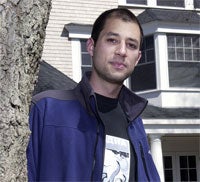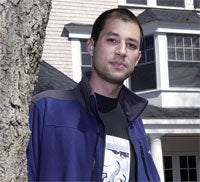 He’s traveling to Costa Rica in June to study mammals on coffee farms
He’s traveling to Costa Rica in June to study mammals on coffee farms
KINGSTON, R.I. — May 13, 2005 — When Jeffrey Backer graduates from the University of Rhode Island on May 22, he’ll not only have the distinction of being the top wildlife biology student in his class, he’ll also have an exciting research expedition to Costa Rica to look forward to.
“I took an environmental science class in high school with an awesome teacher, Mr. Rath, and it was that experience with environmental science that led me to pursue it in college,” said Backer.
The East Greenwich resident chose to attend URI for the hands-on learning opportunities he knew were available in the University’s wildlife biology program. As a junior and senior he took advantage of those opportunities by working with Professor Scott McWilliams.
“Dr. McWillliams is interested in the ecology of migratory songbirds at stop-over sites such as Block Island,” Backer said. “These are places where songbirds stop to refuel during their long migratory flights. I helped out in his research by working in the field and in his laboratory, and I conducted my own research project looking at the consumption of fruit by songbirds on Block Island during autumn migration.”
Backer took a year off from his studies following his freshman year, and he returned to school motivated to “do something that might allow me to travel and spend a lot of time outside.”
After graduation, Backer will be doing a lot of both. Along with two professors and seven other students, he leaves on June 1 to travel to Costa Rica for three weeks to conduct research on the mammals that live on the many coffee farms in that country.
“Coffee farms dominate the land as well as people’s lives in many tropical countries, and so it’s important to study these landscapes to determine their importance to wildlife and implications for future conservation efforts,” Backer said. “As countries continue on the path of development, the way people use the land and interact with the environment will change. More research is needed to determine the impact of changing land use and to find land uses that support both an improved quality of life and the conservation of biodiversity and other natural resources.”
When Backer returns from Costa Rica, he’ll seek employment as a research assistant to get additional experience conducting fieldwork. “I also plan to go back to school to get graduate degrees in wildlife biology and ecology.”

